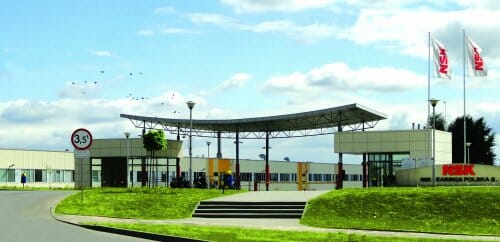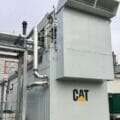NSK has signed a contract with the electricity provider of its two UK manufacturing facilities in Newark (industrial bearings and linear guides) and Peterlee (automotive bearings) that ensures the supply of ‘green electricity’ generated from wind power. In other words, the provider confirms that it is producing green electricity from renewable sources to match the consumption demands of NSK’s UK-based plants.
With these contracts, all five NSK European production plants – including Munderkingen in Germany and Kielce and Wałbrzych in Poland – are now sourcing green electricity, as is the company’s European headquarters and technology centre in Ratingen, Germany. This positive development is one of many steps that NSK is taking to reduce the impact of its activities on the environment, and is part of the company’s European target to achieve the operation of carbon-neutral manufacturing facilities (scope 1 and 2 emissions) by 2030.
The use of green energy has a considerable impact on the reduction of climate-affecting emissions. When the Kielce factory – the biggest NSK site in Europe – fully switched to electricity from renewable resources in 2019, the subsequent year saw a reduction in emissions of approximately 65,000 tonnes of CO2.
Eddie Ward, Quality and Environmental Systems Manager, EQA (European Quality Assurance), NSK Europe, says: “Whilst the two UK factories are smaller than Kielce in terms of their electricity consumption, we are expecting an annual reduction of around 10,000 tonnes of reported CO2 emissions, which is still a considerable decline. It will also help us reach our sustainability goals and contribute to the fight against global warming.”
In addition to sourcing green energy, 23 NSK facilities worldwide are generating solar and wind energy on-site, reducing CO2 emissions by about 3,900 tonnes per year. This activity meets with the company’s ongoing ambition to reduce energy consumption at its factories and offices.
As early as 2008, NSK introduced a KPI for the environmental impact of each new product: the so-called ‘Neco’ factor.
Says Eddie Ward: “With this factor, we address eco-efficiency indicators to assess the eco-friendliness of our products comprehensively and quantitatively. Our goal is to develop new products with a Neco score of 1.2 or higher. In 2020, we achieved this goal with six new environmentally friendly products, comprising bearings, linear guides, actuators and greases. We are continuing this activity with all our new product developments.”








